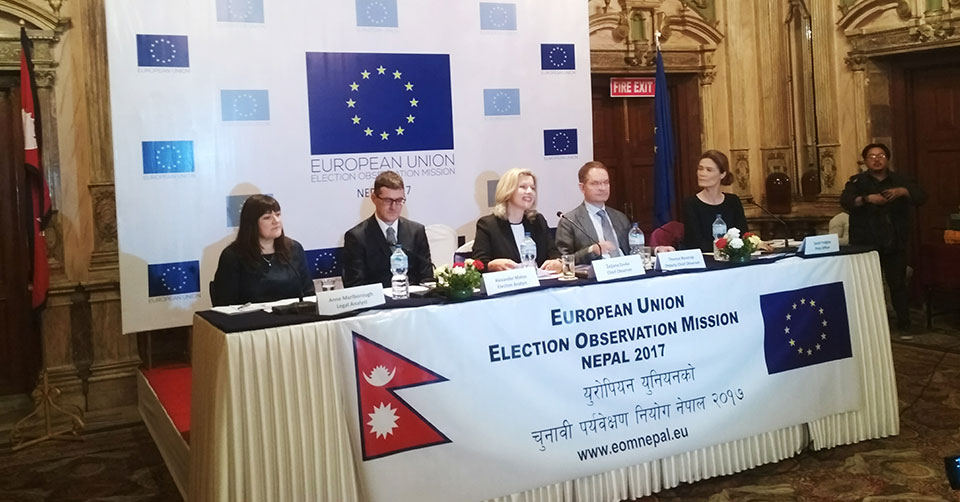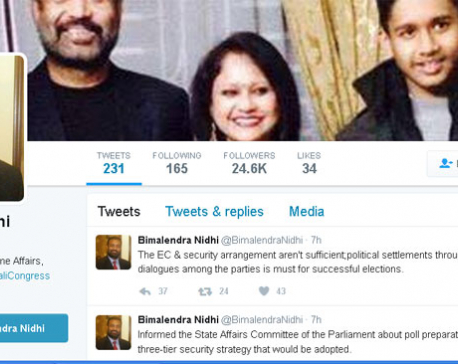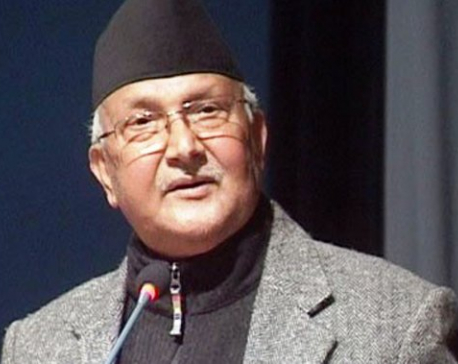
OR
EU accuses EC of not maintaining transparency in elections
Published On: March 21, 2018 06:30 AM NPT By: Republica | @RepublicaNepal

KATHMANDU, March 21: An international observation group has accused Nepal's Election Commission (EC) of not maintaining transparency while conducting three sets of crucial elections last year.
The accusation from the European Union Election Observation Mission (EUEOM), a major poll observation group, comes at a time when the election commissioners already face accusations of irregularities in procuring logistics for and managing the elections. Media reports were critical of election commissioners and top bureaucrats from the very beginning since the government announced the elections in February last year.
But the election commissioners defended themselves in the past. This time, however, they did not respond to the EUEOM's allegations. Some commissioners did not receive the call when Republica contacted them for comments on EU's allegations, while a commissioner, who received the call, refused to comment on the matter saying he was yet to go through the report.
Releasing its final election monitoring report in Kathmandu amid a function, the head of EUEOM, Željana Zovko, recommended to the election body to maintain transparency in the coming days. "Enhance the transparency of the EC by regular consultations with stakeholders, and the timely publication of all information of public interest," the mission stated in its recommendation submitted to the election body.
The mission said the election body's work lacked transparency although the commission performed its duties impartially and enjoyed public confidence. "There was, for example, no mechanism for regular consultations with election stakeholders, and the EC failed to publish critical information on polling centre turnout and invalid votes," states the report, adding, "There were also procedural weaknesses, particularly in relation to the reconciliation of ballots. Voter education was also inadequate, in some areas non-existent."
The EC had spent Rs 750 million on voter education in the local elections and more than Rs 1 billion was spent for federal parliament and provincial assembly elections.
The number of invalid votes was high in both the elections. As many as 22 percent invalid votes were recorded in the local elections but the election body never made public the number of invalid votes officially.
Election commissioners were also dragged into controversy after they transferred the EC secretary who refused to purchase luxurious cars for the commissioners, arguing that each commissioner already had two or three cars.
The poll observation group has also accused the EC of not punishing election code violators despite having extensive power to hold political parties and candidates accountable to the election code. "…yet it dealt with complaints in a largely informal manner, requesting that those in violation stop the behavior complained of. This lack of enforcement undermined the integrity of the code," states the report.
The report has said that the freedom of expression and political freedom - including the right to vote and to stand for election, and freedoms of association, assembly and expression - prevailed in the elections despite a series of violent attacks against candidates in the election.
The report has opposed the quota systems for Brahmins and Chhetris in the elections. "The quota system, in an effort to promote gender and social inclusion, also includes groups that are already well-represented," the report states, "This is arguably in contravention of international standards on equality, as affirmative action measures are foreseen only as a means to promote equality."
You May Like This

DPM Nidhi tweets EC, security arrangements not sufficient for elections
KATHMANDU, April 17: Deputy Prime Minister Bimalendra Nidhi, who is also taking charge of Ministry of Home Affairs, has said... Read More...

Oli accuses ruling coalition of not getting ready for elections
KATHMANDU, Feb 15: CPN-UML Chairman KP Sharma Oli has accused the ruling coalition of not getting ready for holding elections. Read More...

EC ‘not well-prepared’ as elections draw near
KATHMANDU, Jan 3: With just a year remaining till the January 2018 deadline for conducting three sets of elections, the Election... Read More...










Just In
- NRB introduces cautiously flexible measures to address ongoing slowdown in various economic sectors
- Forced Covid-19 cremations: is it too late for redemption?
- NRB to provide collateral-free loans to foreign employment seekers
- NEB to publish Grade 12 results next week
- Body handover begins; Relatives remain dissatisfied with insurance, compensation amount
- NC defers its plan to join Koshi govt
- NRB to review microfinance loan interest rate
- 134 dead in floods and landslides since onset of monsoon this year








Leave A Comment